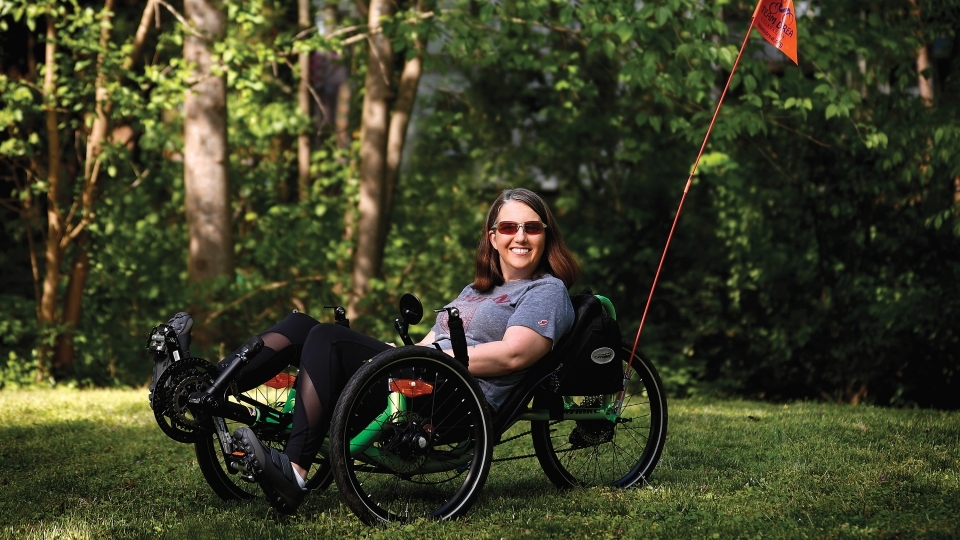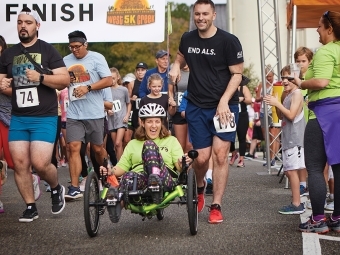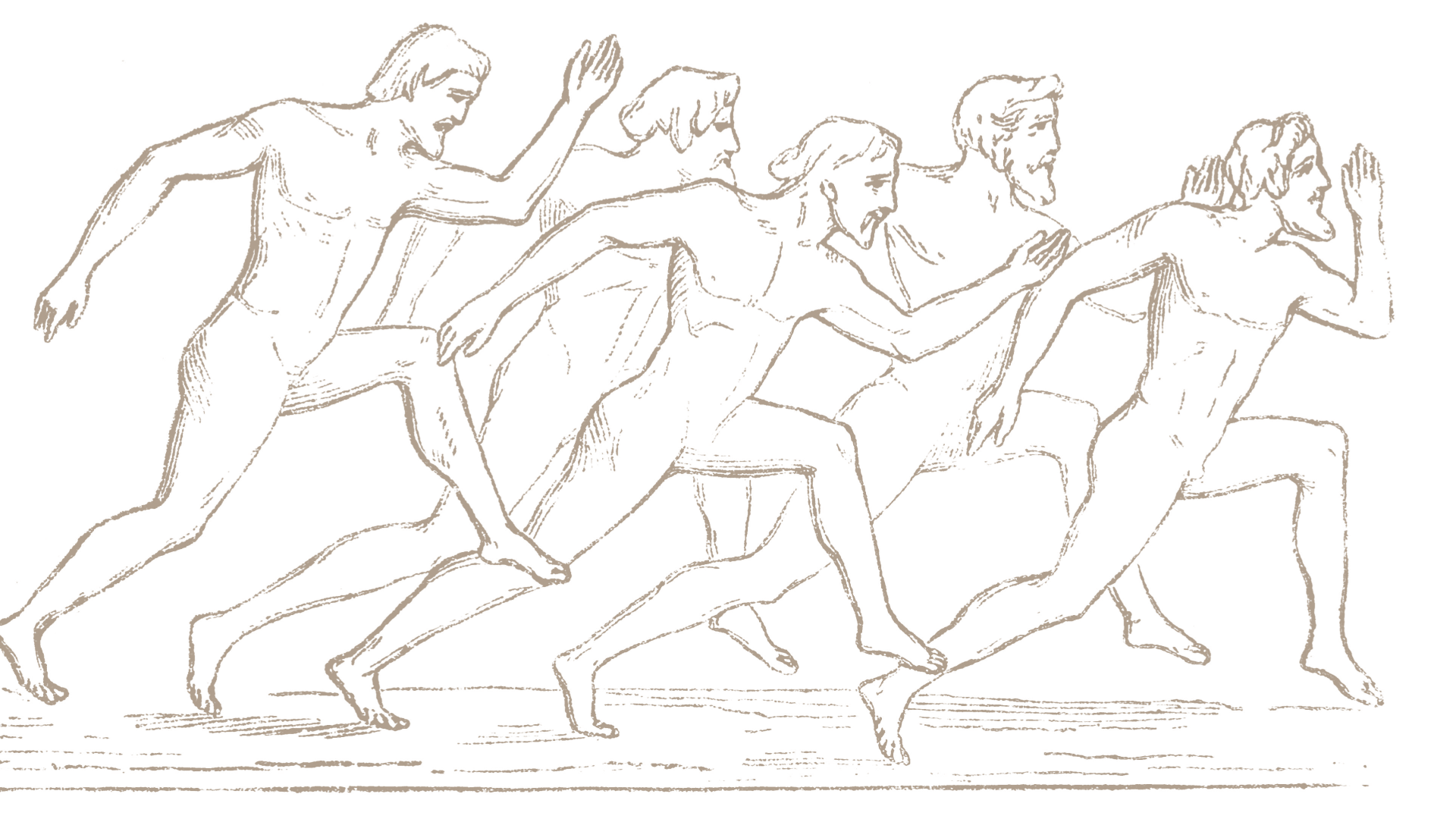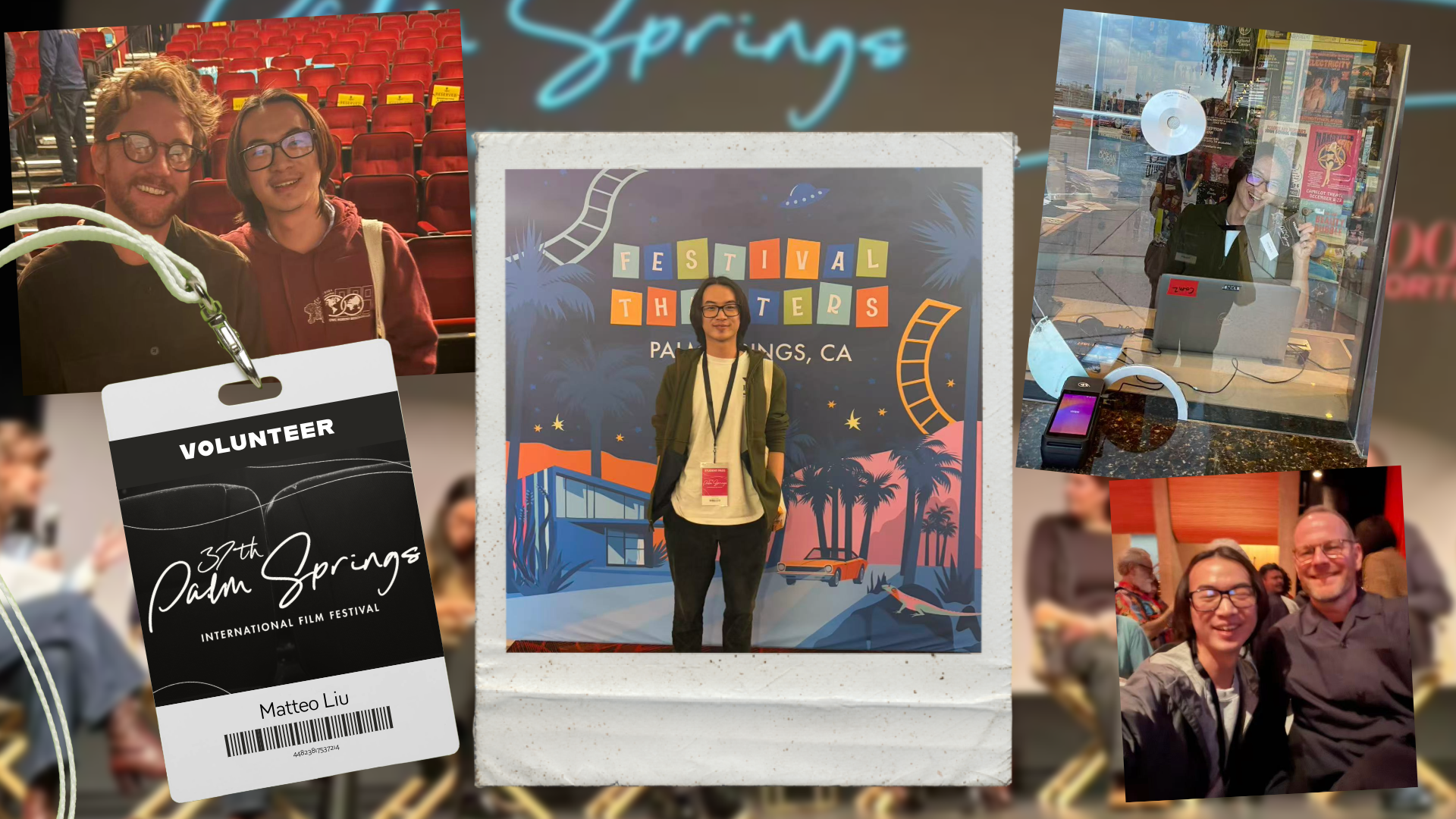Racing Time: Andrea Lytle Peet '03
January 4, 2022
- Author
- Mary Elizabeth DeAngelis

Andrea Lytle Peet plans.
She’s got planes to catch, airports to navigate and people to meet as she travels across America. All of that takes planning, and Peet, a former urban planner, has great respect for details.
Done right, planning saves time. And time matters as she races to outpace the cruel disease that threatens to shorten hers.
Most people with amyotrophic lateral sclerosis (ALS) live an average of about three years after their symptoms begin. More than seven years after her diagnosis, Peet’s still moving, thriving and using her fight to help others with the disease.
Peet, from Davidson College’s class of 2003, wants to become the first person with ALS to compete in marathons in all 50 states. She plans to complete her 50th in Alaska next May. Her journey has garnered extensive media coverage, raising awareness about ALS and money for research. Filmmakers are producing a documentary about her.
Facing your own mortality reinforces how important life is. And now, more than ever, we need to appreciate the gift of life, she says.
The COVID-19 pandemic that started two years ago has killed more than five million people around the world. Recent hurricanes, wildfires and tornados have flooded cities, destroyed homes and taken lives. A car accident, a heart attack—do any of us know how long we have?
“In life, you have no idea what is coming next,” Peet says. “Nothing is certain. People don’t feel safe, they don’t know what will happen, they wonder how long the pandemic will last, and if they’ll get sick.
“I don’t have time to waste so I am very careful, but I am also living life. You have to live your life.”
Dr Pepper Romance
She’s spent much of that life with David Peet ’05.
The two first met in Spanish class at Davidson during spring of her junior year. She’d just returned from a fall semester in Guatemala. He was a freshman and became intrigued during the class’s first get-to-know-you session. They also connected on their club crew team; he rowed and she was a coxswain.
When Spanish classes ended, she’d trek with him to the vending machine in Chambers, saying she craved a Dr Pepper. One day he worked up the nerve to ask her to have lunch.
“I can’t,” she admitted. “I’ve got a class after this, actually right next to our Spanish class. I have been late all semester.”

She agreed to get lunch another time, which led to a restaurant date, and nearly 20 years later, they still laugh about the Dr Pepper.
After graduating from Davidson, she served a year as the college’s Dean Rusk fellow, helping students craft plans to study abroad. She then took a job as a city planner for a group of counties in the western North Carolina foothills.
David Peet graduated from Davidson in 2005 and moved to Washington, D.C., to attend law school at American University. Andrea went to graduate school at Georgia Tech to get a master’s degree in urban planning. He proposed before she moved to Georgia, and they looked forward to the day they’d live together.
They got married in a big ceremony in Durham in 2009. The wedding guests included their families and friends from childhood to Davidson to their work lives. David wore a black tux and Andrea sported a pair of sparkling Chuck Taylor high-tops with her wedding gown.
His family lives in Philadelphia and hers, in Raleigh. They settled in Washington, a good in-between city with plenty of opportunities for their new careers and life together.
Difficult Diagnosis
Snow started her on the running path.
In the winter after their wedding, a blizzard left the Peets snowbound in their Washington apartment. Feeling restless, Andrea discovered a treadmill in their building’s basement and started running. When the snow cleared, she ran outside.
She loved running around the city, passing historic homes, monuments and gardens. As a sustainability planner, a run around the nation’s capital gave her a real-world view of how planning shapes a city.
“Four miles turned into five which turned into 10 miles, and then she decides she should try a race, and then it turns into marathons,” David Peet says. “Andrea is an incremental overachiever.”
In 2013, after a marathon and a few triathlons, she trained to compete in the Carolina Half, a 70.3 half-Ironman distance race. She picked that race because the swim brought her back to Davidson’s Lake Campus, the bike ride took her through Iredell County, and the run weaved through the college’s greenway and cross-country trails.
It was fun to see college friends, and she felt a great sense of achievement after finishing the race. She’d struggled with tight hamstrings and tripped on her toes a few times during training. Then one windy day after the race she fell as she crossed a busy Washington, D.C., street. Another pedestrian helped her up and away from oncoming traffic before flagging a cab to take her home.
She’d seen a neurologist who ordered an Electromyography (EMG) test, which detects abnormalities in electrical action when muscles contract. The neurologist had ruled out ALS. But her symptoms kept worsening. Her voice slowed. She couldn’t clap her hands. They visited a series of specialists along the east coast who speculated on possible causes.
On May 29, 2014, after another series of tests, they met with a specialist at Johns Hopkins in Baltimore. They sat, stunned, as the neurologist said the tests showed “probable” ALS.
“It was shocking, heartbreaking and we didn’t know what to say,” David recalls. “What is probable ALS? We had so many questions, and processing it was indescribable.”
They returned to their hotel room filled with grief.
They talked and they cried. They worried about the devastation their families would feel. They talked about how their relationship would change, and how scared they were. They thought about the house they’d just bought, and the children they’d hoped to raise in it.
Exhausted, they ordered Chinese takeout, grateful for the respite of looking at a menu and choosing between noodles or rice, mild or spicy.
“We weren’t being those brainy Davidson students thinking our way through a problem, we needed room to let the pain and sadness in,” David Peet says. “And we kept telling each other that regardless of how painful it all was, we’d have each other—that we’d always share this pain together.”
One Last Race
After the initial shock and grief, Andrea’s planning genes took over.
“At first, it was about finding a reason for why this happened,’’ says lifelong friend Julie Wesner. “That turned into what could she do to make her life purposeful?”
Their friendship began as toddlers and grew as they did. They attended the same pre-school, elementary, middle and high schools. They went to summer camps and on family vacations with each other. Peet played the French horn in their school bands, Wesner, the clarinet.
“She’s so smart and was driven to do well, but she was also well-rounded—it wasn’t just about academics,” Wesner says. “She was happy and cheerful and liked to have fun.”
Peet started planning for college early and brought a book detailing their options to a high school beach vacation. She decided on Davidson, and Wesner, UNC-Chapel Hill. Wesner, now an elementary school teacher, remembers visiting Peet at Davidson and joining her for an early morning crew practice.
“It was cold and dark and I thought she was crazy for doing this,” Wesner says, “But that’s so Andrea. She’s always challenging herself.”
Shortly after learning about the ALS, they went on a girl’s trip to Annapolis. Peet wanted to do one last triathlon, the Ramblin’ Rose in Raleigh, but worried that she wouldn’t be strong or stable enough. “No that’s way too nerdy,” she said when Wesner suggested a trike.
“A few weeks later she called me and said, ‘Guess what? I got a trike,’’’ Wesner says. “And we signed up for the race.”
The two set out on a cold morning, swimming in frigid water, then triking. Peet used walking sticks for the final run portion, and they were a good hour behind the rest of the athletes. Volunteers on bikes rode up from behind, encouraging them.
Exhausted, they hobbled arm-in-arm to the finish line where a big crowd had stayed to cheer for them. The Queen song “We Are the Champions” blared in the background. They scattered the confetti they’d made as little girls for New Year’s Eve celebrations.
“It was a moment I’ll never forget,” Wesner says. “Everyone there was so happy that she finished—you could just feel all the love and support surrounding her.”
What’s Your Brave?
That “last” race turned into another, and then another.
With each race, Peet challenged her friends to join her, or do something that intimidated them. “Go on, be brave,” became her mantra. She and David founded a non-profit, Team Drea, which has since raised more than $750,000 for ALS research.
The Ramblin’ Rose also inspired a new goal—to complete 50 marathons in 50 states.
That 50 is a target number on several fronts. Team Drea will launch its “$50 for 50” fundraising campaign in the spring leading up to her 50th marathon. Whether it’s doing 50 pushups, walking 50 miles in a month or writing 50 sentences for a book in progress, Team Drea hopes people will step up to the challenge of “What is Your Brave?” to appreciate what their bodies can do.
Peet’s close friend Shaw Hipsher ’03, who often travels with her to races, plays a key role.

Hipsher, development communications coordinator at Clemson University, works tirelessly to publicize Peet’s quest. Newspapers and news programs around the country have run features about her.
“We’re excited to get her story out there,” Hipsher says. “We hope the impact will grow and grow. We want to make it a real grass roots effort to show that the way to celebrate Andrea is to challenge yourself.”
Things to Do
The Peets now live in Raleigh, near Andrea’s parents. David Peet is an attorney there, and Andrea is president of the Team Drea Foundation.
He tries to make as many races as possible. They schedule vacations around races, aiming to hit several states at a time in a general vicinity.
“I love when other people who have challenges see her racing,” he says. “They want to know her story. She’s created quite a following and has helped a lot of people change their lives. It’s great to see your partner be that inspiring force of nature. She’s so impressive.
“It’s such a privilege and it’s a fun way to see the country with the best traveling partner ever. Her default setting is happy and optimistic, and that helps me keep a positive attitude,” he says. “I want to make every single one of her goals and dreams come true, and I want to be with her every step of the way.”
Davidson alumni often show up at races to compete or lend support. In October, the Hardywood Brewery in Richmond hosted its annual West Creek 5K fundraiser that honors Peet and supports ALS research. Peet’s Davidson classmates Eric and Rebekah Rush McKay ’03, founded the brewery with Eric’s childhood friend. They named one of their beers Andrea’s Ale, and she always enjoys one after the 5K.
“The race was sweet and wonderful, it’s such a fun family atmosphere,” Andrea says. “It was great to reconnect with a couple of Davidson classmates I’d lost contact with—I think I may have convinced them to run a race with me. And the prototype batch for this year’s Andrea’s Ale, which is infused with ginger and turmeric, is delicious!”
Many marathon runners share a goal of hitting one in all 50 states. They usually spread them out over years—even decades. Peet initially hoped to finish her 50 marathons by this past spring, but the pandemic’s shutdown thwarted that timeline. She’s completed 46 since 2016 and is set to finish her 50th over next Memorial Day weekend in Alaska.
The Durham-based independent film company Flying Squirrel Films has followed her journey for a documentary, “Go On, Be Brave,” about her life. The crew plans to be in Alaska for the race and will film as she gets her eighth swallow tattoo.
The swallow tattoo has become a symbol for the ALS community. On the second anniversary of her diagnosis, Peet got two on her arm. She’s celebrated each anniversary by getting another. She now has seven, and the latest wears a mask to commemorate the pandemic.
“One glorious day we will find a cure for ALS,” she says, “And my arms will be covered in swallows.”
Until then, she’s got things to do.
“I hope I can inspire people to go out and be brave, to get out of their comfort zones and learn about themselves,’’ she says. “I have been given a gift of time that most people with ALS don’t get. I know how quickly it can all be taken away.”
Musings From America
Andrea Lytle Peet ’03 began her 50-marathon odyssey in Virginia on a frigid March morning in 2016. At the time, she was just returning to the site of the only marathon she’d ever run. Little did she know Virginia would be the first marathon on a quest she hopes to finish in the spring of 2022, in Alaska. Below are some of her observations from the road:
Most Beautiful: Montana
Snow covered peaks and gorgeous valleys. A great distraction because it was all uphill for the first seven miles, and I wasn’t sure I’d make it. Fortunately, the next 19 were all downhill—I hit 30 mph!
Most Surprising: Oregon
A beaver dam and bald eagle nest rerouted the course off the paved trail through a bushwhacked field and over tree roots. Good thing I had Anna Katherine Clemmons ‘01 and Elizabeth Spitz ‘03 with me to help me when I got stuck.
Most Difficult: West Virginia
The nighttime race went through a state park so dark I couldn’t tell what was ahead of me, especially when my headlamp went out.
Most Fun: All of Them!
Every day in the trike is a good day. I may get frustrated or sore, but then I remember how lucky I am to get to do this.
This article was originally published in the Fall/Winter 2021 print issue of the Davidson Journal Magazine; for more, please see the Davidson Journal section of our website.



